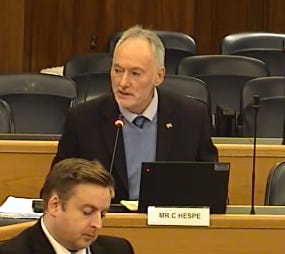Kent County Council ploughs on with reform plans despite lack of support
Reform Party goes it alone in solo pitch for single status
HERE is a question for you: what institution in Kent might serve 1.9m people; would be larger than 13 American states and would have 160 elected members? Oh, and also have three regional assemblies as part of its make-up?
If you’re flummoxed by this, don’t panic - you are not alone: the government is pushing ahead with plans for local government reform that will see the introduction of sweeping powers and freedoms for a new generation of local unitary authorities.
Now, the single unitary option has one or two obstacles in its path: the chief one being that it is not one that county councils are being encouraged to set up.
Unfortunately for KCC’s high command (that’s the new Reform Party administration), there is resistance from a number of directions - with the leaders of all twelve districts and boroughs refusing to endorse KCC’s plan, leaving it a touch isolated to go it alone.
A report which set out the latest situation was studiously neutral on the possible problems KCC faces when a cross-party committee known as The Devolution and Local Government Re-organisation Cabinet probed the report on the plans it had.
More criticism came the way of the authority when a Conservative election strategist warned the plans were labelled as “unmanageable and unworkable.” Conservative county councillor Andrew Kennedy told the meeting:
“I am not sure that the policy being developed by this council is right; this is a once-in-a-lifetime opportunity, creating a council that will be the largest in Europe with 1.9m people; is larger than thirteen American states; larger than 83 countries. It will have to have, by the Boundary Commission guidelines, 160 members. That is twice what we have at the moment - it will be unmanageable. But most of all, it will create a top-down organisation that will have few links with the communities it is created to serve.”
“All this is being done without a single piece of public consultation” - a claim that was not strictly accurate as on the same day, just such a public consultation got underway.
Reform Party spokesman Cllr Chris Hespe denied the council was going to end up as a ‘top down” authority claiming that “we would not call it a ‘mega’ council’ but an inclusive one.”
Chris Hespe denied that KCC was taking a parochial position: “We are not looking at this as a parochial thing…and I’m not saying that other council leaders are…the local consultation will guide us as to what people want from the local government review or indeed if they want anything at all.”
There was a measured but damning appraisal of the authority’s masterplan from Lib Dem group leader Anthony Hook, who filleted the alternative Reform Party scheme delicately, saying that when the leaders of all councils met to discuss it, not a single one supported the idea.
“The big problem with this idea of regional assemblies is that it is going to end up with over centralisation; the best safeguard is actually to have other councils; the idea of a ‘mega’ council vacuuming up other councils is not attractive.”
The notion of having three regional groupings as part of the plan is a case of whether a square peg can be found to fit in a round hole. Any type of “regional” set-up has in the past been vilified by the Conservatives and it’s a surprise - or maybe not - to find the Reform Party embrace the concept so fulsomely.
Still, at least there is some reasonably solid financial evidence base to it - notwithstanding the caution that needs to be exercised when deliberating on these matters. The chief beneficiary is likely to be services for the elderly, where the pressure on council budgets is huge and according to the county council calculations, could save it and Medway some £16m on vulnerable children and adult care services.
That initial saving could be followed by needing to spend £40m less each year on the same services.
The government will need some persuading if it is to grant some kind of a special exemption for Kent.
When it does eventually land on a desk at the Department for Local Government, it will probably get a shrug of the shoulders and be sent back for more work to be done.
One interesting dimension to all this is that as things stand, Kent would be the only authority in the entire south east region not to have some kind of elected mayor within any new set up.
And as intriguing is the fact that the Conservatives are leading the charge over this: the apparent support for retaining so-called ‘regional assemblies’ is an example of how the law of unintended consequences might impact the Garden of England.



